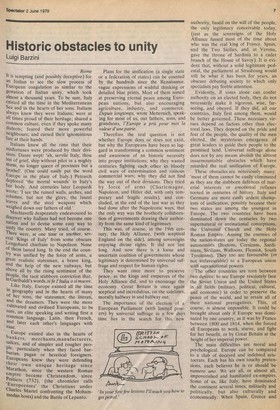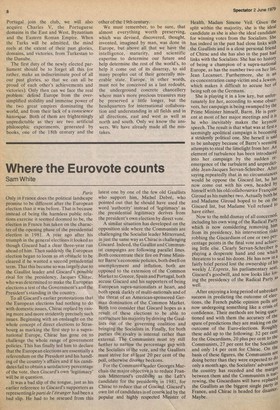Historic obstacles to unity
Luigi Barzini
Rome It is tempting (and possibly deceptive) for an Italian to see the slow process of European coagulation as similar to the gestation of Italian unity, which took almost a thousand years. To be sure, Italy existed all the time in the Mediterranean Sea and in the hearts of her sons. Italians always knew they were Italians; were at all times proud of their heritage; shared a common culture, even if they spoke many dialects; feared their more powerful neighbours; and cursed their ignominious fate at their hands.
Italians knew all the time that their misfortunes were produced by their divisions. Dante wept: 'A, servile Italy, thou inn of grief, ship without pilot in a mighty storm, no longer queen of provinces but a brothel'. (One could easily put the word Europe in the place of Italy.) Petrarch deplored 'the mortal wounds' in Italy's fair body. And centuries later Leopardi Wrote: 'I see the ruined walls, arches, and columns, but not the glory, the laurel leaves and the steel weapons which weighed down our fathers of old.'
Machiavelli desperately endeavoured to discover why Italians had not become one nation and to devise some easy way to unify the country. Many tried, of course. There were, at one time or another, several 'Kings of Italy' from some obscure Longobard chieftain to Napoleon. None of them lasted long. In the end the country was unified by the force of arms, a great realistic statesman, a brave king, and the help of the new railways, but above all by the rising sentiment of the People, the tacit stubborn conviction that, in Garibaldi's words,si fa l'Italia o simuore. Like Italy, Europe existed all the time in geography and in the hearts of many of her sons, the statesmen, the literati, and the dreamers. They were the more cultivated and civilised Europeans, to be sure, an elite speaking and writing first a common language, Latin, then French, and later each other's languages with ease.
Europe existed also in the hearts of bankers, merchants,manufacturers, sailors, and of simpler and rougher people. particularly when they faced barbarian, pagan or heretical foreigners. Europeans knew they were defending their own unique heritage since Marathon, since the western Roman empire became Christendom, since Poitiers (732), (the chronicler calls 'Europeenses the Christians under Charles Martel confronting the Mohammedan hosts) and the Battle of Lepanto. Plans for the unification (a single state or a federation of states) can be counted by the hundreds since the Renaissance.
vague expressions of wishful thinking or detailed blue prints. Most of them aimed at preserving eternal peace among Euro pean nations, but also encouraging agriculture, industry, and commerce.
Depuis longtemps, wrote Metternich, speaking for most of us, our fathers, sons, and grandsons, l'Europe a pris pour moi la valeur d'une patrie.
Therefore the real question is not whether Europe does or does not exist, but why the Europeans have been so lag gard in transforming a common sentiment and awareness of an historic necessity into proper institutions; why they wasted centuries fighting each other in bloody civil wars of extermination and ruinous commercial wars; why they did not find the way out of their divisions. They tried by force of arms (Charlemagne, Napoleon, and Hitler did, with only tem porary and fragile results), and concluded, at the end of the last war as they had done after the Napoleonic wars, that the only way was the brotherly collaboration of governments drawing their authority from the same kind of legitimacy.
This was, of course, in the 19th century, the Holy Alliance, (with sceptical England on the side), among sovereigns enjoying divine rights. It did not last long. And now there is a loose and uncertain coalition of governments whose legitimacy is determined by universal suffrage and respect for human rights.
They want once more to preserve peace, as the kings and emperors of the Holy Alliance did, and to encourage the economy. Great Britain is once again sceptical and incredulous, on the sidelines, morally halfway in and halfway out.
The importance of the election of a European Parliament (with limited powers) by universal suffrage in a few days time lies in the search for this new authority, based on the will of the people, the only legitimacy conceivable today, (just as the sovereigns of the Holy Alliance fussed most of the time about who was the real king of France, Spain, 'and the Two Sicilies, and, at Verona, gave the throne of Sardinia to a cadet branch of the House of Savoy). It is evident that, without a solid legitimate pedestal, the parliament at Strasbourg would still be what it has been for years, an obscure debating society to which only specialists pay feeble attention.
Evidently, if votes alone can confer authority on an elected body, they do not necessarily make it vigorous, wise, farseeing, and obeyed. If they did, all our countries, Italy first among them, would be better governed. These necessary virtues depend on factors other than electoral laws. They depend on the pride and fear of the people, the quality of the men elected, the mysterious emergence of great leaders to guide their people to the promised land. Universal suffrage alone does not by any means abolish the almost insurmountable obstacles which have retarded the real unification of Europe.
These obstacles are notoriously many: 'most of them cannot be easily eliminated as they are the stubborn defences of material interests or emotional reflexes rooted in centuries of history. Italy and Germany are more easily ardent champions of unification, possibly because their two states are among the youngest in Europe. The two countries have been dominated down the centuries by two supernatural or antinational conceptions, the Universal Church and the Holy Roman Empire. Among the enemies of the nation-states are today the regional autonomists (Bretons, Corsicans, Sardinians, Sicilians, Walloons, Flemish, South Tyroleans). They too are favourable (or not unfavourable) to a European union with supranational powers.
The other countries are torn between two desires: to see Europe resolutely face the Soviet Union and the United States in all fields (military, political, cultural, and economic) in order to preserve the peace of the world, and to retain all of their national prerogatives. This, of course, is almost impossible. It could be brought about only if Europe was dominated by one country, as it was by France between 1800 and 1814, when she forced all Europeans to work, starve, and fight for her benefit, or by Great Britain at the height of her imperial power.
The main difficulties are moral and psychological. Europe can be compared to a club of decayed and indebted aristocrats. Each has his own touchy pretensions, each believes he is or should be numero uno. We are all, or almost all, impoverished and humiliated ex-empires. Some of us, like Italy, have dominated the continent several times, militarily and politically, but also culturally and economically. When Spain, Greece and Portugal join the club, we will also acquire Charles V, the Portuguese domains in the East and West, Byzantium and the Eastern Roman Empire. When the Turks will be admitted, the mind reels at the extent of their past glories, domains, and victories, from Turkestan to the Danube.
The first duty of the newly elected parliament should be to forget all this (or rather, make an indiscriminate pool of all our past glories, so that we can all be proud of each other's achievements and victories). Only then can we face the real problem: defend Europe from the oversimplified stolidity and immense power of the two great empires dominating the world, and from their lack of a conscience historique. Both of them are frighteningly unpredictable as they are two artificial philosophic experiments, generated by books, one of the 18th century and the other of the 19th century.
We must remember, to be sure, that almost everything worth preserving, which was devised, discovered, thought, invented, imagined by man, was done in Europe, but above all that we have the intelligence, maturity, and scientific expertise to determine our future and help determine the rest of the world's, to help it come out of its disarray, to aid many peoples out of their generally miserable state. Europe, in other words, must not be conceived as a last redoubt, the underground concrete chancellery where man's more precious treasures may be preserved a little longer, but the headquarters for international collaboration and understanding in all fields and in all directions, east and west as well as north and south. Only we know the answers. We have already made all the mistakes.







































 Previous page
Previous page